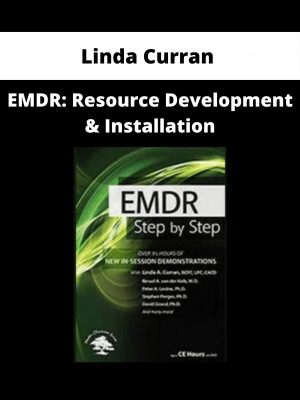Daniel J. Fox – Overcoming the Narcissistic Dynamic, Successful Treatment Techniques
$200 Original price was: $200.$75Current price is: $75.
Shopping Instructions:
- DISCOUNT 15% : SHOP15
- Product Delivery: Within 1 – 12 hours after purchase.
This treatment-focused recording will help you learn the skills to successfully work with, and manage, the narcissistic spectrum client, their partners, and their children.
Daniel J. Fox – Overcoming the Narcissistic Dynamic, Successful Treatment Techniques
Clients with Narcissistic Personality Disorder (NPD) are often reluctant to attend therapy and can be difficult to successfully treat. While this can be a rewarding process, it’s not without its challenges and requires a specific set of skills.
But it’s not just the narcissistic client you are likely to see in your office. Often times, it’s the partners and children of the narcissist who are seeking treatment due to being left in their loved one’s dysfunctional wake
This treatment-focused recording will help you learn the skills to successfully work with, and manage, the narcissistic spectrum client, their partners, and their children.
Working with partners in narcissistic spectrum relationships presents unique challenges that require specific therapeutic approaches and skills. This recording will help you gain those skills and maximize therapeutic sessions to lessen relationship difficulties and build resistance to narcissistic spectrum manipulations often seen in clients in narcissistic spectrum relationships.
Children of narcissistic spectrum parents often present with unique and complex symptoms that disrupt therapeutic trajectory and keep them stuck in place. You can affect change in these individuals, you can help them overcome the burdens, guilt, and regret they carry with the tools and techniques learned through this recording.
This unique, fun, and impactful recording will guide you through the process of treating your clients along the narcissistic spectrum, their partners, and their children!
- Create a treatment plan for better outcomes of clients along the narcissistic spectrum.
- Incorporate evidence-based techniques to address and change maladaptive patterns in your narcissistic spectrum clients, their partners, and their children.
- Develop skills to help your narcissistic spectrum clients, their partners, and their children learn adaptive relationship skills while minimizing maladaptive relationship pathology.
- Explore the factors that keep partners in relationships with narcissists and provide strategies for building resistance and resiliency against manipulative behavior.
- Differentiate between the different narcissistic spectrum parent types to improve treatment outcomes among their children.
- Develop effective assessment skills and clinical strategies for effectively treating children of narcissistic spectrum parents.
Would you like to receive Daniel J. Fox – Overcoming the Narcissistic Dynamic, Successful Treatment Techniques ?
Narcissistic Spectrum Treatment Foundations
- Core belief: “Since I am special, I deserve special rules”
- Five central components to accurate narcissistic diagnosis
- Core and/or surface structure of the narcissistic spectrum
- Gender differences and narcissistic personality disorder
- Narcissistic neurology
- Attachment and pathological narcissism
- Pathological continuum, treatment errors, and speaking narcissism
- Key target areas for treatment
- Five categories of therapeutic responses to narcissism
- Therapist reactions to narcissism
- Psychopharmacology and narcissism
Treating the Narcissistic Client
Setting the Stage for Successful Treatment
- Narcissists don’t seek treatment
- To treat or not to treat: the distinction and overlap between NPD and Antisocial PD
- The distinction between entitlement and NPD
- Complications to treatment planning – mild to extreme factors
- NPD subtypes
Address and Change Maladaptive Patterns
- Identify surface and core structure
- Assess investment and motivation in treatment
- Manage narcissistic power struggles
- Getting underneath the veneer of perfectionism: competency, autonomy, relatedness, and purpose
- Narcissistic reaction from stress to rage
The Treatment Plan: Dig Deeper into Motivations and Lessen Symptomatology
- Enhance personal empowerment to lessen maladaptive narcissistic behaviors
- Assertiveness over aggression
- Lengthen the fuse to prevent explosions
- Learn and implement new behavioral, emotional, and thought patterns
- Strengthen appropriate social power, interaction methods, and control
Final Steps of Successful Treatment
- Conceptualizing successful treatment
- Treatment plan goals and examples
Treating the Partner of a Narcissist
Setting the Stage for Successful Treatment
- What is and what may never be and challenging foundational beliefs
- The narcissistic self-serving significant other (SO)
- When they are caught in a blackmail trap
- Assess continuance of dissolution of the relationship
Address and Change Maladaptive Patterns
- Break the cycle of glorifying, belittling, and abandoning
- Clarify and maintain boundaries
- Manage and lessen mental manipulation
- Power to choose
Treatment Plan: Dig Deeper into Motivations and Lessen Symptomatology
- Breaking free from the narcissistic partner
- 7 hopes and realities expanded
- Clarify client wants, deserves, and must-haves
- No more roller coaster
- The foundational 5: communication, mutual respect, trust, acceptance, and shared interests and values
Final Steps of Successful Treatment
- Together or apart
- Stay who you are
Treating the Impact of Narcissistic Parents
Setting the Stage for Successful Treatment
- Narcissistic family characteristics
- The Narcissistic parent identified
- Components of adult children of Narcissists
- The family of my dreams
Address and Change Maladaptive Patterns
- Identify the engulfing or ignoring narcissistic parent type
- Avoid “The Family Crucible” trap
- The narcissistic parent and self-definition
- Fight backhanded and hurtful comments
Treatment Plan: Dig Deeper into Motivations and Lessen Symptomatology
- The gift of narcissistic pathology
- Overcome destructive inner narcissistic family member
- Differentiation of child from parent exercise
- Parenting differently
Final Steps of Successful Treatment
- The family dynamic influencers
- Therapeutic milestones
Related products
NLP & Hypnosis
NLP & Hypnosis
NLP & Hypnosis
NLP & Hypnosis
NLP & Hypnosis
NLP & Hypnosis












